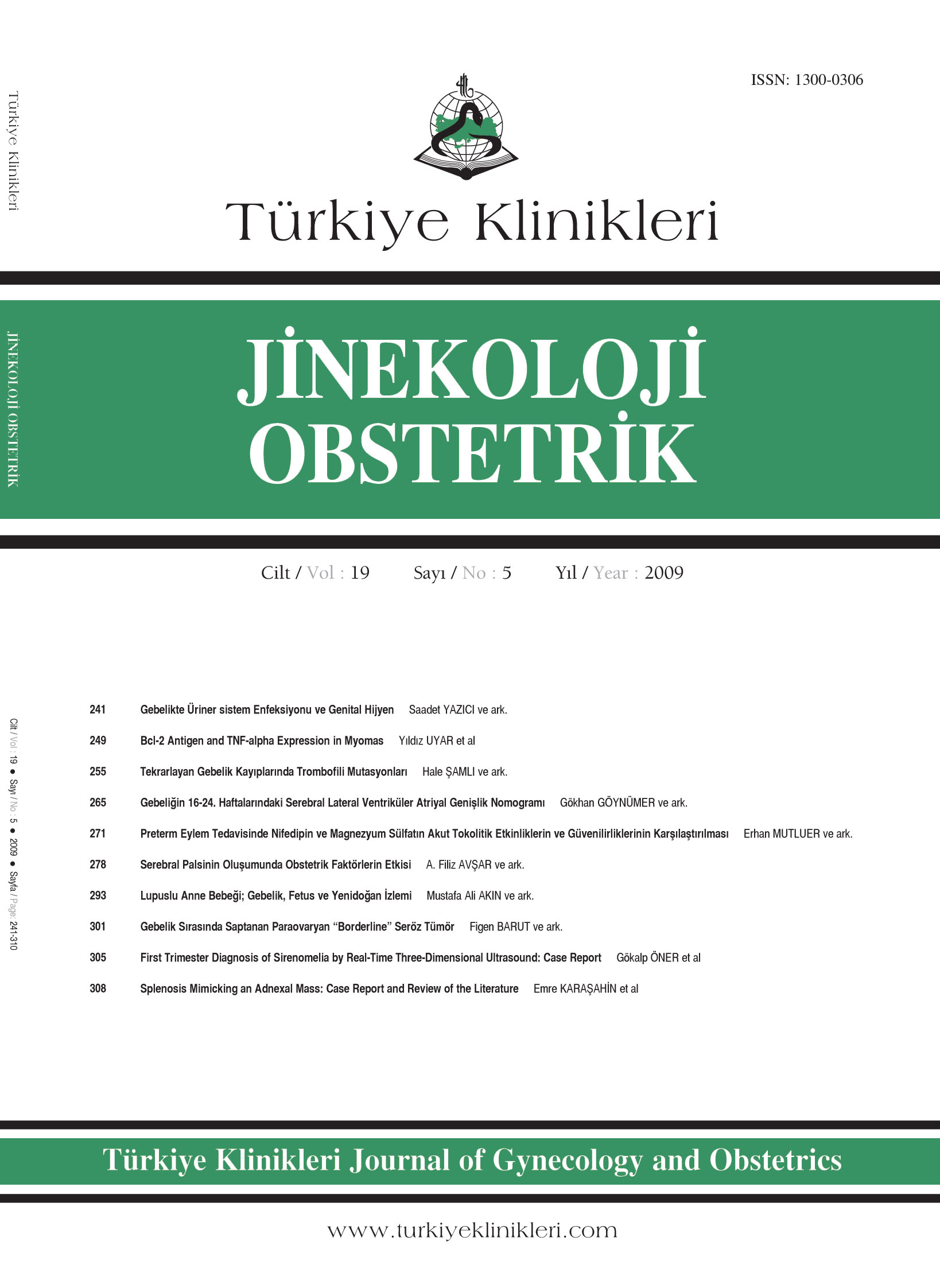Open Access
Peer Reviewed
ORIGINAL RESEARCH
3843 Viewed1755 Downloaded
Urinary Tract Infection and Genital Hygiene in Pregnancy
Gebelikte Üriner Sistem Enfeksiyonu ve Genital Hijyen
Turkiye Klinikleri J Gynecol Obst. 2009;19(5):241-8
Article Language: TR
Copyright Ⓒ 2025 by Türkiye Klinikleri. This is an open access article under the CC BY-NC-ND license (http://creativecommons.org/licenses/by-nc-nd/4.0/)
ÖZET
Amaç: Araştırma, gebelikte üriner sistem enfeksiyonu (ÜSE) ile genital hijyen alışkanlıkları arasındaki ilişkiyi saptamak amacıyla planlandı. Gereç ve Yöntemler: Retrospektif bir vaka-kontrol çalışması olan araştırma, T.C. Sağlık Bakanlığı İstanbul Bakırköy Kadın Doğum ve Çocuk Hastalıkları Eğitim ve Araştırma Hastanesinde 15 Ekim 2005-15 Ocak 2006 tarihleri arasında yapıldı. Araştırma grubunu bu tarihler arasında hastanenin kadın doğum polikliniğine başvuran 290 gebe kadın oluşturdu. Çalışma grubunu gebeliğinde ÜSE tanısı olan 145; kontrol grubunu ise aynı tarihlerde polikliniğe başvuran ve ÜSE olmayan 145 gebe kadın oluşturdu. Bulgular: Çalışma grubundaki kadınların %68.3'ünün ÜSE tanısının sistit olduğu ve %45.5'inin 1. trimesterde bu tanıyı aldığı ve yarısına yakının da (%40.8), enfeksiyonun tekrarladığı belirlendi. Olguların %54.5'inin idrar testinin pozitif olduğu ve ilaçla tedavi gördüğü (%70.3) saptandı. Çalışma ve kontrol grubu arasında tuvalet sonrası el yıkama (çalışma %88.3, kontrol %97.2 p< 0.01, OR= 0.214), vajinal akıntı için bez-ped kullanma (çalışma %70.3, kontrol %57.9, p< 0.05,OR= 1.723), idrar yapmayı geciktirme (çalışma %60.7, kontrol %49.0, p< 0.05, OR= 1.609), kullanılan iç çamaşırı türü (çalışma %21.4, kontrol %10.3, p< 0.01, OR= 12.02) gibi hijyenik uygulama ve alışkanlıkların gebelikte ÜSE açısından istatistiksel olarak anlamlı fark olduğu belirlendi. Sonuç: Araştırma sonunda çalışma ve kontrol grubunda yer alan gebe kadınların hijyenik alışkanlıklarının ÜSE'nin oluşumunda etkili olduğu görüldü.
Amaç: Araştırma, gebelikte üriner sistem enfeksiyonu (ÜSE) ile genital hijyen alışkanlıkları arasındaki ilişkiyi saptamak amacıyla planlandı. Gereç ve Yöntemler: Retrospektif bir vaka-kontrol çalışması olan araştırma, T.C. Sağlık Bakanlığı İstanbul Bakırköy Kadın Doğum ve Çocuk Hastalıkları Eğitim ve Araştırma Hastanesinde 15 Ekim 2005-15 Ocak 2006 tarihleri arasında yapıldı. Araştırma grubunu bu tarihler arasında hastanenin kadın doğum polikliniğine başvuran 290 gebe kadın oluşturdu. Çalışma grubunu gebeliğinde ÜSE tanısı olan 145; kontrol grubunu ise aynı tarihlerde polikliniğe başvuran ve ÜSE olmayan 145 gebe kadın oluşturdu. Bulgular: Çalışma grubundaki kadınların %68.3'ünün ÜSE tanısının sistit olduğu ve %45.5'inin 1. trimesterde bu tanıyı aldığı ve yarısına yakının da (%40.8), enfeksiyonun tekrarladığı belirlendi. Olguların %54.5'inin idrar testinin pozitif olduğu ve ilaçla tedavi gördüğü (%70.3) saptandı. Çalışma ve kontrol grubu arasında tuvalet sonrası el yıkama (çalışma %88.3, kontrol %97.2 p< 0.01, OR= 0.214), vajinal akıntı için bez-ped kullanma (çalışma %70.3, kontrol %57.9, p< 0.05,OR= 1.723), idrar yapmayı geciktirme (çalışma %60.7, kontrol %49.0, p< 0.05, OR= 1.609), kullanılan iç çamaşırı türü (çalışma %21.4, kontrol %10.3, p< 0.01, OR= 12.02) gibi hijyenik uygulama ve alışkanlıkların gebelikte ÜSE açısından istatistiksel olarak anlamlı fark olduğu belirlendi. Sonuç: Araştırma sonunda çalışma ve kontrol grubunda yer alan gebe kadınların hijyenik alışkanlıklarının ÜSE'nin oluşumunda etkili olduğu görüldü.
ANAHTAR KELİMELER: Kadın üriner sistem enfeksiyonları; kadın üriner sistem hastalıkları ve gebelik komplikasyonları; gebelik
ABSTRACT
Objective: The study was planned to establish the relationship between urinary tract infections (UTI) and genital hygiene habits during pregnancy. Material and Methods: This retrospective case-control study was conducted October 15, 2005-January 15, 2006 at the İstanbul Bakırköy Ob/Gyn and Pediatrics Training and Research Hospital. The sampling included 290 pregnant women who presented at the hospital's Ob/Gyn clinic in the mentioned period. Of these women, 145 women diagnosed with UTI constituted the study group and 145 the control group who had applied to the clinic without UTI. It was found that 68.3% of the women in the study group had urinary infections diagnosed as cystitis, that 45.5% had been diagnosed in their first trimester and that close to half the women (40.8%) had had repeated bouts of the infection. Results: Of the cases, 54.5% tested positive and were treated with drugs (70.3%). A statistically significant difference was seen between the study and control groups in the incidence of UTI during pregnancy as a result of hygienic practices and habits such as washing hands after going to the toilet (study group 88.3%; control group 97.2%; p< 0.01, OR= 0.214), using sanitary pads for vaginal flow (study 70.3%; control 57.9%; p< 0.05, OR= 1.723), postponing urination (study 60.7%; control 49.0%; p< 0.05, OR= 1.609), and using certain types of underwear (study 21.4%; control 10.3%; p< 0.01, OR= 12.02). Conclusion: Research results showed that the hygienic habits of the pregnant women in both study and control groups had an effect on the development of urinary tract infections.
Objective: The study was planned to establish the relationship between urinary tract infections (UTI) and genital hygiene habits during pregnancy. Material and Methods: This retrospective case-control study was conducted October 15, 2005-January 15, 2006 at the İstanbul Bakırköy Ob/Gyn and Pediatrics Training and Research Hospital. The sampling included 290 pregnant women who presented at the hospital's Ob/Gyn clinic in the mentioned period. Of these women, 145 women diagnosed with UTI constituted the study group and 145 the control group who had applied to the clinic without UTI. It was found that 68.3% of the women in the study group had urinary infections diagnosed as cystitis, that 45.5% had been diagnosed in their first trimester and that close to half the women (40.8%) had had repeated bouts of the infection. Results: Of the cases, 54.5% tested positive and were treated with drugs (70.3%). A statistically significant difference was seen between the study and control groups in the incidence of UTI during pregnancy as a result of hygienic practices and habits such as washing hands after going to the toilet (study group 88.3%; control group 97.2%; p< 0.01, OR= 0.214), using sanitary pads for vaginal flow (study 70.3%; control 57.9%; p< 0.05, OR= 1.723), postponing urination (study 60.7%; control 49.0%; p< 0.05, OR= 1.609), and using certain types of underwear (study 21.4%; control 10.3%; p< 0.01, OR= 12.02). Conclusion: Research results showed that the hygienic habits of the pregnant women in both study and control groups had an effect on the development of urinary tract infections.
MENU
POPULAR ARTICLES
MOST DOWNLOADED ARTICLES





This journal is licensed under a Creative Commons Attribution-NonCommercial-NoDerivatives 4.0 International License.










